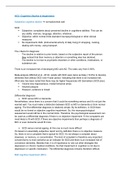HC5: Cognitive Decline & Impairment
Subjective cognitive decline normal/worried well
SCD
Subjective: complaints about perceived decline in cognitieve abilities. This can be
any ability: memory, language, attention, whatever…
Objective: within normal limits standard neuropsychological or other clinical
measures
No impairments IADL (Instrumental activity of daily living) shopping, cooking,
dealing with money, using transport.
The criteria for diagnosis:
- The decline is relative to prior levels, based on the subjective report of the person:
they noticed that their memory or attention or something else has declined.
- The decline is not due to psychiatric disorders or other conditions, medications, or
substance use.
There is an increased risk of developing MCI and AD. The rates vary from 5-50%.
Meta-analysis (Mitchell et al., 2014): adults with SCD were twice as likely (10.9%) to develop
dementia than without SCD over 4-year period. Indicating that there is an increased risk.
What also has been noted that there may be higher frequencies AD biomarkers (SCD plus):
Volume loss hippocampus, medial temporal areas
Amyloid plaques
However, evidence is mixed.
Differential diagnosis
SCD versus MCI or dementia
Nevertheless, since there is a concern that it could be something serious and it's not just the
worried well. You must make a distinction between SCD vs MCI or dementia or from normal
ageing. The first differential diagnosis is relatively simple. By its definition, in SCD there
would be no formal or objective cognitive impairment. So, the neuropsychological
assessment would still be in the normal limits. Therefore, the psychological assessment can
be used as a differential diagnosis if there is no objective impairment the complaints are
most likely to fit with SCD. If there are objective impairments than perhaps a diagnosis of
MCI or even dementia would fit more.
SCD versus normal ageing this one is much more difficult
It's based on essentially subjective report and by definition there is no objective measure.
So, there is not a complaint that is typical for SCD: it's not always a complain about
slowness, or memory, or concentration. The kind of complaint is therefore very important:
concern/worry is more sensitive as an indicator for SCD and there is an increased risk of
conversion dementia. Besides that, it is of importance to rule out other etiologies like
depression or chronic medical conditions. So that impairment in cognition is not due to
depression or specific medication. The differential diagnosis remains therefore difficult.
Mild cognitive impairment (MCI)
, The increased risk for dementia is much better established here, the link is clearer. In MCI
there is also an objective indication of cognitive impairment. So, it's a decline of cognitive
performance that is greater than expected from the persons’ age. At the same time, the
decline is not that severe to warrant a diagnosis of dementia. In MCI, it's not seen as normal
ageing, therefore it is seen as a pathological condition.
MCI: pathological condition and it's not part of normal ageing.
MCI: stage between normal cognition and dementia in terms of severity (less severe
than dementia but more severe than you expect in normal ageing) and progression
(there is a proportion of persons with MCI who progress to dementia, but also a
proportion who don’t and remain stable or revert back to normal cognitive ageing)
Diagnosis
Original criteria Petersen (1999), Mayo criteria:
Subjective complaint memory impairment
Objective evidence of memory deficit: deficits on neuropsychological tests
o 1.5 SD below norm on 20 min. delayed recall story A of WMS Logical Memory
Task
Overall cognitive functions should be preserved (MMSE > 24 or higher)
Intact activities of daily life
Absence of dementia (consensus diagnosis): different professionals looked at the
evidence and argued that there is not enough proof for dementia.
These criteria are very limited and only include memory as a cognitive domain. Of course,
there is more than just memory:
Revised criteria
NIA-Alz Association task force for MCI (Albert et al. 2011):
Concern about change in cognition
o Change is larger than expected from person’s age, education
Evidence impairment in one or more cognitive domains (it doesn’t need to be only
memory) 1-2 SD’s below mean
Preservation independence in daily functioning: or only mild difficulties. The person
can still live independently and care for himself.
Not demented: difficulties IADL not severe enough to interfere with someone’s social
or occupational functioning.
Overlap criteria for minor neurocognitive impairment DSM 5 DSM also requires
that changes not due to delirium or Axis 1 disorders (depression, schizophrenia)
Overlap ‘cognitive impairment no dementia’ (CIND) this one is more broad
o CIND: any cognitive disorder (not only memory) from various possible
causes, including drug use, alcohol abuse, psychiatric illness, degenerative
illness.
o MCI is more specific than CIND





